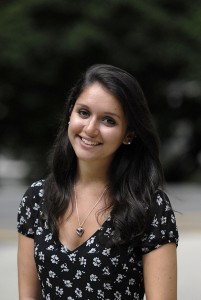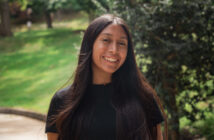I’m sitting in my favorite coffee shop on campus, mindlessly checking to-do items off my list for the day. Copies of the most recent issue of The Brown and White are strewn on tables around the café. I’ve already read through it a few times, so it is resting a few inches from my computer.
A student sits down with his friend at a table nearby and picks up the paper. Seconds after he glances at the front page, he throws it down and begins to furiously criticize the article. I am ripped from my concentration and jerk my head up to glare at him.
Doesn’t he know I’m sitting right there? Doesn’t he realize I’m the managing editor of The Brown and White? Doesn’t he understand how much time that reporter spent researching and writing that article? Doesn’t he consider how many hours I put into editing it?
He doesn’t. And I don’t believe I’m entitled to tell him.
As students at Lehigh, it is ingrained in us to engage in dialogue about issues on campus. We are encouraged to become involved in a multitude of diverse organizations. One of the most valuable aspects of a Lehigh education is the opportunity to experience leadership in different spheres throughout the community and develop intersectional relationships.
But what happens when one of those organizations is held to a different standard? Being a journalist for the student newspaper requires balance. We pride ourselves on being part of a professional organization. However, we are here to learn and prepare ourselves for a career after graduation.
Professional journalists don’t have the privilege of having an opinion. Researching, investigating and reporting are part of the job. And dealing with the potential backlash that comes with a controversial story (or any story, for that matter) is a responsibility all the same.
Student journalists have the opportunity to set an agenda. We cover the issues that promote dialogue at Lehigh, whether or not the subsequent conversations are positive or productive. We are courageous, becoming a faceless name behind our byline for our objective pieces of work. But then we must quietly stand by and watch progressive moments happen around us.
In an educational environment, it is a constant battle to determine when I should hold firm in my role as a journalist or when I should be a student leader, jumping in and participating in dialogues surrounding sensitive issues. By writing these stories, we work through all perspectives to ensure the voice is fair and well rounded. The student journalist voice is critical, but somewhat silenced.
One of the most difficult aspects of being part of this small community, though, is the fear of how the negative perception of the media will affect my reputation as a student leader in organizations other than The Brown and White.
According to a 2014 Gallup survey, Americans are only 40 percent confident in the media’s ability to report news wholly, accurately and fairly. This has negative implications for the industry on a national level. But if the same statistic holds true for student media organizations, I fear that members of the Lehigh community will not be able to separate my identity as an individual from their mistrust of the media.
While I am an editor, I am also the president of a Greek organization. On a campus where at its highest points, Greek life makes up some 40 percent of the student body, it would be impossible not to cover it in the student newspaper. I am confident in my ability to remain unbiased when it comes to being a leader in my sorority and the incoming editor-in-chief of The Brown and White, but I’m not so sure other people see it that way.
These are our peers we are writing about – the same people we interact with in our classes, socialize with during extracurricular activities, and sometimes even live with.
This presents reporters and editors an unintended opportunity: to maintain accountability within the student body and the greater Lehigh community. Nothing about this process is simple. When articles involving our friends or cherished organizations aren’t particularly positive, it would be easy to water down our coverage to protect them. That would be untruthful.
Shining a light on deeper issues is our job. Regardless of opinions, personal interests or friendships, student journalists have a responsibility to incite dialogue when everyone else is afraid to do it. We might not be part of the discussion, but we started it.






Comment policy
Comments posted to The Brown and White website are reviewed by a moderator before being approved. Incendiary speech or harassing language, including comments targeted at individuals, may be deemed unacceptable and not published. Spam and other soliciting will also be declined.
The Brown and White also reserves the right to not publish entirely anonymous comments.